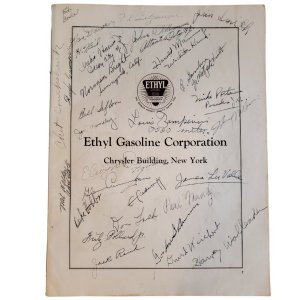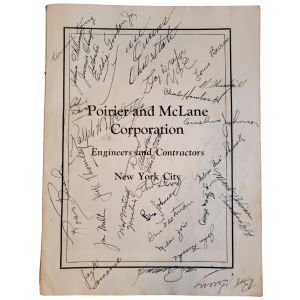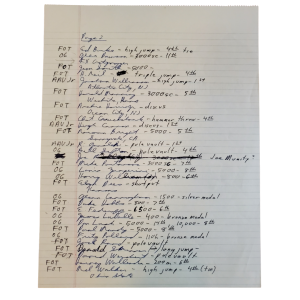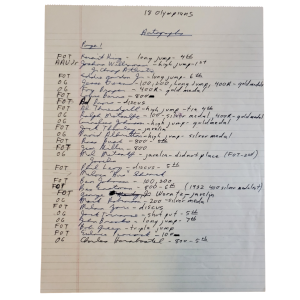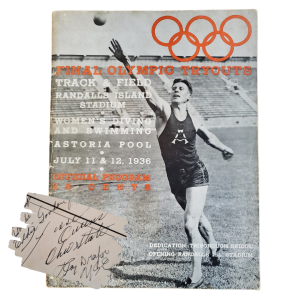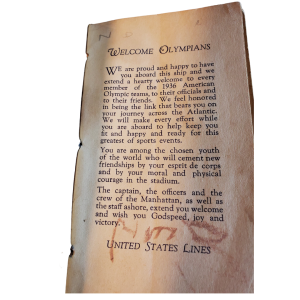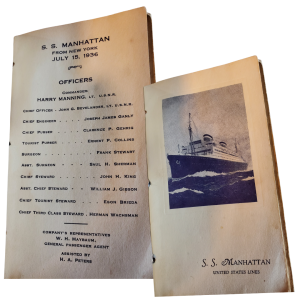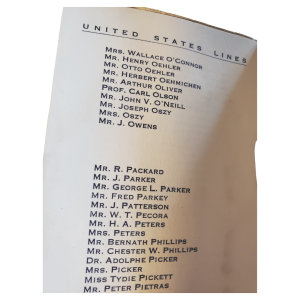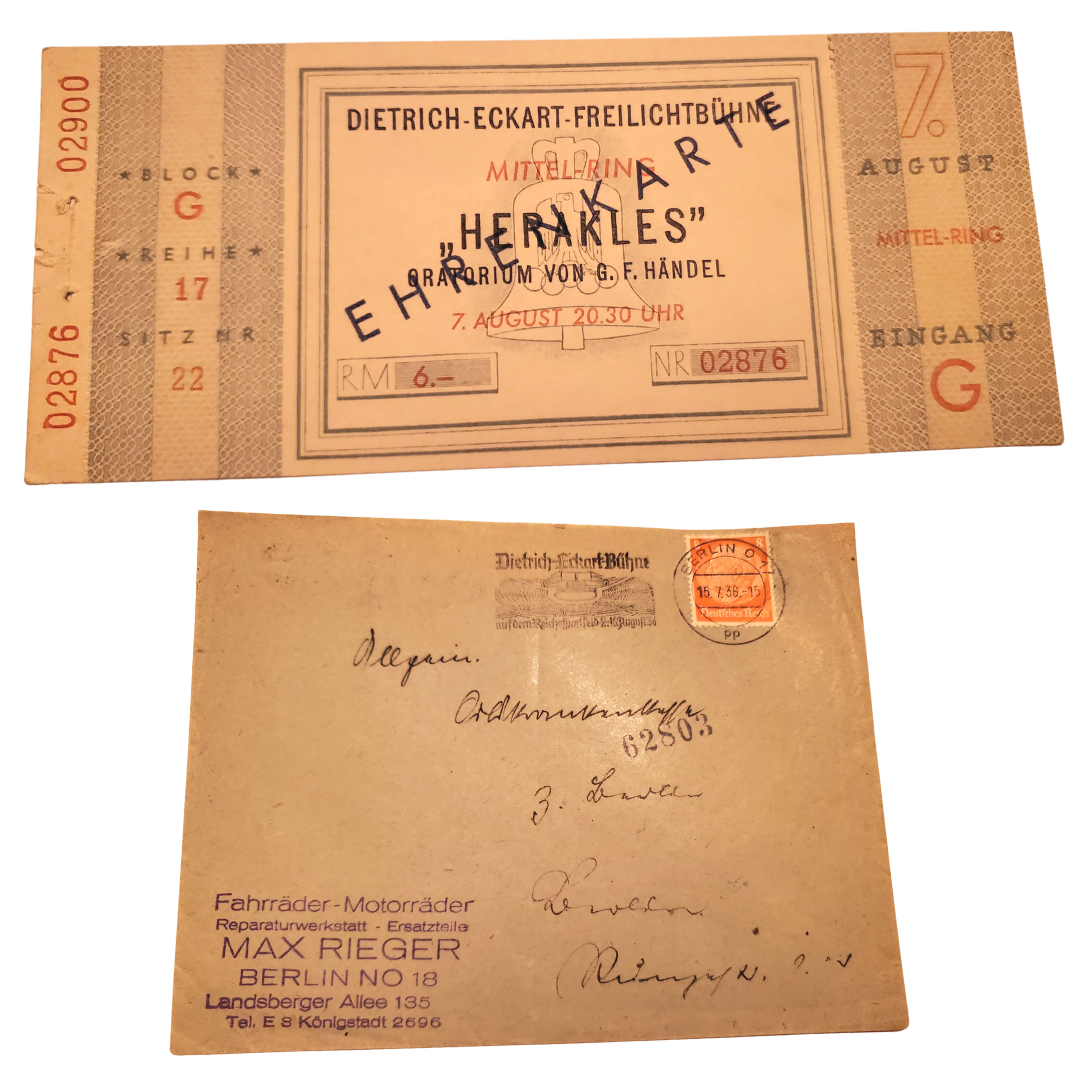1936 Berlin Olympics Opening Ceremony Ticket
Held at the Berlin Olympic Stadium, the Opening Ceremony featured all of the inspiring and landmark features that Hitler envisioned for his world-wide stage. The games were opened by Adolf Hitler saying "I proclaim open the Olympic Games of Berlin, celebrating the Eleventh Olympiad of the modern era."
The Olympic Flame was introduced in 1928 and the torch relay was introduced in the 1936 Olympics. The idea of running the flame from Olympia to the host city was created at the 1936 Olympics.
1936 Berlin Olympics Ausweis For Opening Ceremony Music
Signed by Carl Diem, the Chief Organizer of the Olympics. He is credited with creating the Olympic Torch Relay and was influential in the sports word beyond his involvement with the Deutscher Reichsausschuss für Leibesübungen.
1936 Berlin Olympics Ausweis Athlete
A rare 'ausweis' (identification card) for a Czech Olympian who participated in the 1936 Summer Olympics in Berlin, 2pp. 3.5 x 6 in., issued in Prague, July 20, 1936. The athlete named Jan Chytry was from a town called Roudnice and records show that he participated in boxing for Czechoslovakia, being eliminated in the first round of contention.
The First African American to Win a Gold Medal in the Olympics
The year was 1936. Adolf Hitler had recently been appointed Chancellor of Germany, and would go on to lead the country into World War II. In the United States, the Great Depression was still very much a reality for many people. And in Berlin, Germany, the Summer Olympics were about to begin.
One of the athletes competing in those Olympics was a young man named Jesse Owens. A talented track and field star, Owens had already broken numerous world records. But he was about to make history in a different way; he would become the first African American to win a gold medal in the Olympics.
Owens' achievements came at a time when discrimination against black athletes was still rampant. In the United States, many black athletes were segregated into their own athletic leagues and associations, such as the Negro National League in baseball and the National Basketball League (which later merged with the NBA). Black athletes were also often excluded from hotels, restaurants, and other public places while on road trips with their teams.
But Owens persevered, and his performance in Berlin was nothing short of extraordinary. In addition to winning gold in the 100 meter dash, he also won gold in the 200 meter dash, long jump, and 4x100 meter relay. His achievements were all the more remarkable given that he was competing against racists who believed that blacks were inferior to whites athletically. By defeating them on the world's biggest stage, Owens proved them wrong.
Jesse Owens' historic achievements in Berlin helped break down racial barriers not only in sports, but in society at large. He paved the way for future generations of black athletes, and his legacy continues to inspire people all over the world. The next time you watch Olympic track and field events, remember Jesse Owens and what he accomplished against all odds.
What was Hitler's goal in hosting the 1936 Olympic Games?
Hitler's Olympic Ambitions: What was Hitler's goal in hosting the 1936 Olympic Games? How did Hitler position the 1936 Olympics? What did Hitler do at the 1936 Olympics? Why Was the 1936 Olympics Important?
The 1936 Summer Olympics, held in Berlin, were a unique case in the history of the modern Olympic Games. It was the first—and, to date, only—time that the games were awarded to a city that had not yet built the necessary infrastructure. Furthermore, the games were scheduled for just six months after the International Olympic Committee made its selection, which left little time for preparation. There was also the small matter of a global economic depression to contend with. All of these factors meant that the organizers had their work cut out for them.
But there was one other, more important factor that set the 1936 Olympics apart from all those that came before it: Adolf Hitler. The games were awarded to Berlin shortly after Hitler and his Nazi Party came to power in Germany, and Hitler saw them as an opportunity to showcase his new regime to the world. In the months leading up to the games, he poured millions of Reichmarks into their preparation and used them as a platform to spread Nazi propaganda. He also took steps to ensure that Jewish athletes would be excluded from the German team.
When the games finally arrived, Hitler used them to further his own political goals. He opened them with a speech hailing "the peaceful intent of athletic competition" and proclaiming that "sport has no boundaries." But his actions spoke louder than his words. He spent most of his time at the games avoiding contact with foreign dignitaries, instead using them as an opportunity to meet with military leaders and plan for future wars.
The 1936 Summer Olympics were unlike any that came before or have come since. They were awarded to a city that was not yet ready to host them, and they were overseen by a dictator who saw them as an opportunity to further his own political goals. As a result, they left a complicated legacy that is still being debated by historians today.
Which African Americans won Medals at the 1936 Berlin Olympics?
African American Athletes Who Won Medals at the 1936 Olympics
The 1936 Summer Olympics, held in Berlin, Germany, was a controversial event due to the policies of the German government under Adolf Hitler. The Third Reich had only been in power for three years at the time of the Games, and their racist policies were well-known. In spite of this, a number of African American athletes chose to participate in the Olympics and ended up winning medals. Here is a list of those athletes and their accomplishments.
Jesse Owens - Gold (100 meters, 200 meters, 4 x 100 meter relay)
Born in 1913 in Danville, Alabama, Jesse Owens was one of the most successful track and field athletes of his generation. He set three world records and tied another at the 1935 Big Ten track meet. This attracted the attention of Adolf Hitler, who saw Owens as an example of "Aryan supremacy." However, Owens went on to win four gold medals at the 1936 Olympics, dealing a blow to Nazi propaganda. He later said that Hitler "didn't snub me—it was FDR who snubbed me. The president didn't even send me a telegram."
Jesse Owens retired from athletics in 1941 and died in 1980 at the age of 66.
Ralph Metcalfe - Gold (4 x 100 meter relay), Silver (100 meters)
Ralph Metcalfe was born in 1910 in Chicago. He competed in both track and field events and won two gold medals as part of the 4 x 100 meter relay team at the 1932 Summer Olympics in Los Angeles. He also won a silver medal in the 100 meter dash at those same Games. Four years later, he again won gold as part of the 4 x 100 meter relay team and added a silver medal in the 200 meter dash. Ralph Metcalfe retired from athletics in 1938 and died in 1978 at the age of 68.
Eulace Peacock - Bronze (100 meters)Eulace Peacock was born in 1913 in Trenton, New Jersey. He set several world records during his career but never won an Olympic medal—until 1936. Peacock finished third in the 100 meter dash at the Berlin Games, winning a bronze medal. It would prove to be his only Olympic medal; he did not compete at the 1940 or 1944 Games due to injuries sustained during a car accident. Eulace Peacock died in 1983 at the age of 70.
These are just some of the African American athletes who won medals at the 1936 Summer Olympics despite competing under difficult circumstances. Their achievements are all the more impressive when you consider what they had to overcome both on and off the playing field. These athletes made history and paved the way for future generations of black athletes who would follow in their footsteps.
Full List
- Jesse Owens - Gold (100 meters, 200 meters, long jump, 4 x 100 meter relay)
- Mary Terstegge Meagher - Gold (100 meter butterfly)
- Eulace Peacock - Gold (4 x 100 meter relay), Silver (100 meters), Bronze (200 meters)
- Arthur Wint - Gold (400 meters), Silver (4 x 400 meter relay)
- Cornelius Johnson - Gold (high jump)
- John Woodruff - Gold (800 meters)
- Mack Robinson - Silver (200 meters)
- Charles Fonville - Silver (4 x 400 meter relay)
- Cleveland McQueen - Bronze (4 x 400 meter relay)
- David Albritton - Bronze (high jump)
- Gregory Martin Roller - Bronze (pole vault)
- Fritz Pollard Jr. - Bronze (4 x 100 meter relay)

